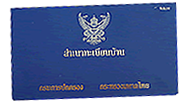Condominium ownership by foreigners
2.1 – Foreign nationals (natural and juristic persons) may have ownership* of a condo (apartment unit or flat) in Thailand within the foreign ownership quota of a condominium, but ‘aliens’ buying a condo in Thailand must qualify for foreign ownership under section 19 of the Thailand Condominium Act. Foreign freehold ownership of a condo in Thailand means that:

- a) not more than a percentage of 49% of the total unit floor area in a condominium can be foreign owned, the remaining 51% must be owned by Thai natural or juristic persons (i.e. in case of 100 equal apartment units in a condominium building only 49 can be foreign-owned), and;
- b) when foreign ownership is available the foreigner buying a condo must qualify for ownership under section 19 of the Condominium Act, usually this means having properly brought into Thailand foreign currency at least equal to the total purchase price of the condo and having exchanged this amount into Thai baht inside Thailand.

Buying apartments not registered under the Condominium Act by foreigners
There are two types of residential apartment buildings in Thailand – condominiums registered and licensed with the Land Department offering outright ownership over the individual units, and apartment buildings NOT licensed as a condominium and therefore not offering individual ownership over the units. On the outside these buildings could look the same but legally they cannot be compared. Condominiums registered and licensed with the Land Department must comply with the legal structure as laid down in the Condominium Act which is built around individual unit ownership, joint ownership of the common areas and joint management of the building by all the unit owners. Unregistered apartment structures are not regulated by specific condominium laws and the developer of an apartment building can sell possession (not ownership) of the units in the building under his own terms and conditions. There are various contract structures under which these units are sold which vary from time-sharing schemes, mere apartment leases to leases combined with shares in a holding company. Beware, these apartment projects do not offer individual freehold ownership of the units and the purchasers do not find protection in the law as with registered condominiums. The contract structures and intention of the developer should be triple checked (e.g. the content of the lease structure, management system of the building, and ongoing financial costs through maintenance and management contracts).
Rental, hire or lease in Thailand

House ownership separate from the land
5.1 Foreigners can’t own land but are allowed to own the building separate from the land. Basically there are 2 ways of obtaining ownership over the house separate from the land, a– you build a house upon leased land (with or without a right of superficies) or b– you buy an existing house separate from the land and obtain a land lease. Transfer of an existing house must be in writing and registered with the competent authority (i.e. the Land Department/ branch office). The transfer of ownership of an existing house starts at the local land office and requires a 30 day public announcement of the sale at specified locations after which the transfer of ownership of the house is completed by the local land office. It should be noted that ownership of a house on land owned by someone else is relative to the right to use the land (e.g. the land lease and/ or the right of superficies term). When the right to use the land expires, the right to own the house on the land expires with it.
Tabien Baan or House Registration Book
5.2There are 2 types of Tabien Bahn: The blue book (Thor.Ror.14) for Thai nationals and; the yellow book (Thor.Ror.13) for foreigners. A Ta.Bian.Baan (house book), pronounced as Tabien Baan, is the government issued booklet with the official exact address of the house and registers the (Thai) persons who live in the house. It could state the name of the owner but in case of a foreign owner not necessarily. Note that a house in Thailand (separate from the land) does not have an official ownership title deed document. A house book is not an ownership document but merely a house and resident registration book. Proof of ownership of a structure (separate from the land) is usually established by the Thai script construction permit issued by the local Or.Bor.Tor (if any) with the owner’s name on it or the the official Thai script land office sale agreement in case of transfer of ownership of an existing house.

